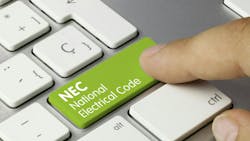Understanding General Requirements of the NEC, Part 4
Article 110 of the National Electrical Code provides general requirements for all installations. Section 110.3 covers the following:
- Examination and identification;
- Installation and use;
- And listing.
Under "examination and identification," you’ll see seven specific criteria, plus an eighth one (cybersecurity) that’s new with the 2023 revision. The list ends with a ninth one, which is basically saying "etcetera: other factors that contribute to the practical safeguarding of people if in contact with the equipment." To satisfy all these criteria, buy your electrical supplies from a reputable source, use them for the intended application, and ensure they are in serviceable condition.
There’s no enumerated list under “installation and use.” There’s a single sentence that says to make sure you use the right equipment (per its labeling, listing, or identification) and install it (and use it) per any instructions included in the listing. You need to become familiar with how various raceways, fittings, and conductors are intended to be used. Much of that will come through craft capability (usually via on the job training). For example, a journeyman knows better than to use EMT fittings on conduit.
There’s no enumerated list under “listing” either. It also has a single sentence. The crux of this requirement is that product testing, evaluation, and listing must be done by a qualified testing laboratory. As a user/installer, all you have to do is look for the testing lab symbol on the product or in its accompanying literature. But beware — counterfeit products often bear counterfeit symbols that closely resemble the real ones. The best defense against this fraud is (as before) to buy your electrical supplies from a reputable source.
Since buying from a reputable source makes compliance with Sec. 110.3 and other general requirements so much easier, it helps to understand what a reputable source is. All of your major home centers are reputable sources, as are established electrical distributors and established hardware stores. These companies are proactive about not giving people a reason to sue them. And unlike fly by night operations, they cannot escape a lawsuit by merely closing shop. Plus, having an untarnished reputation is part of their business strategy, so they are meticulous about their own sourcing.
Avoid sources that don’t have a reputation to uphold, as buying from them can cost you your own reputation. Due to the merchantability principle in the Uniform Commercial Code (see U.C.C. § 2-314. U.C.C. § 2-314(1)), you can’t defend against civil liability by blaming your source (which would have already flown the coop by then anyhow). You are the expert upon whom the onus of the public safety failure falls, because of what is stated in Sec. 110.3 and other legally binding rules, regulations, and documents.
About the Author

Mark Lamendola
Mark is an expert in maintenance management, having racked up an impressive track record during his time working in the field. He also has extensive knowledge of, and practical expertise with, the National Electrical Code (NEC). Through his consulting business, he provides articles and training materials on electrical topics, specializing in making difficult subjects easy to understand and focusing on the practical aspects of electrical work.
Prior to starting his own business, Mark served as the Technical Editor on EC&M for six years, worked three years in nuclear maintenance, six years as a contract project engineer/project manager, three years as a systems engineer, and three years in plant maintenance management.
Mark earned an AAS degree from Rock Valley College, a BSEET from Columbia Pacific University, and an MBA from Lake Erie College. He’s also completed several related certifications over the years and even was formerly licensed as a Master Electrician. He is a Senior Member of the IEEE and past Chairman of the Kansas City Chapters of both the IEEE and the IEEE Computer Society. Mark also served as the program director for, a board member of, and webmaster of, the Midwest Chapter of the 7x24 Exchange. He has also held memberships with the following organizations: NETA, NFPA, International Association of Webmasters, and Institute of Certified Professional Managers.
